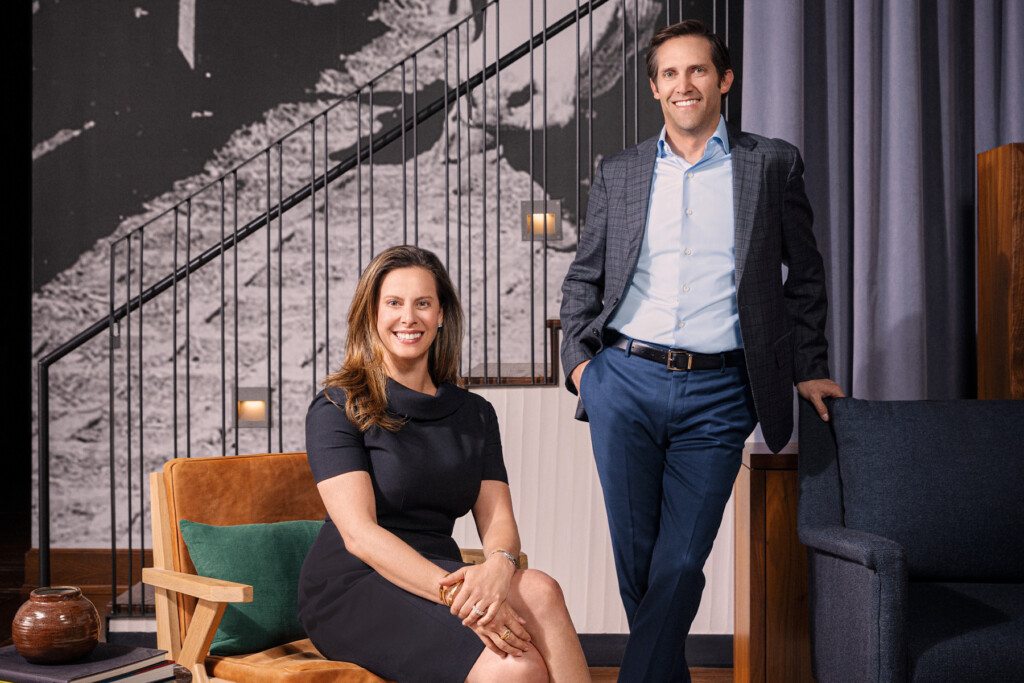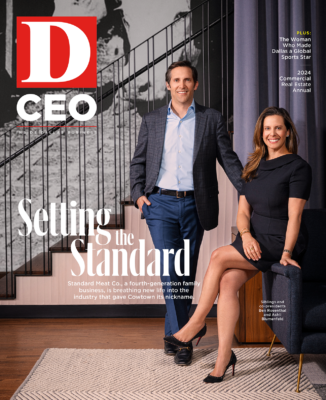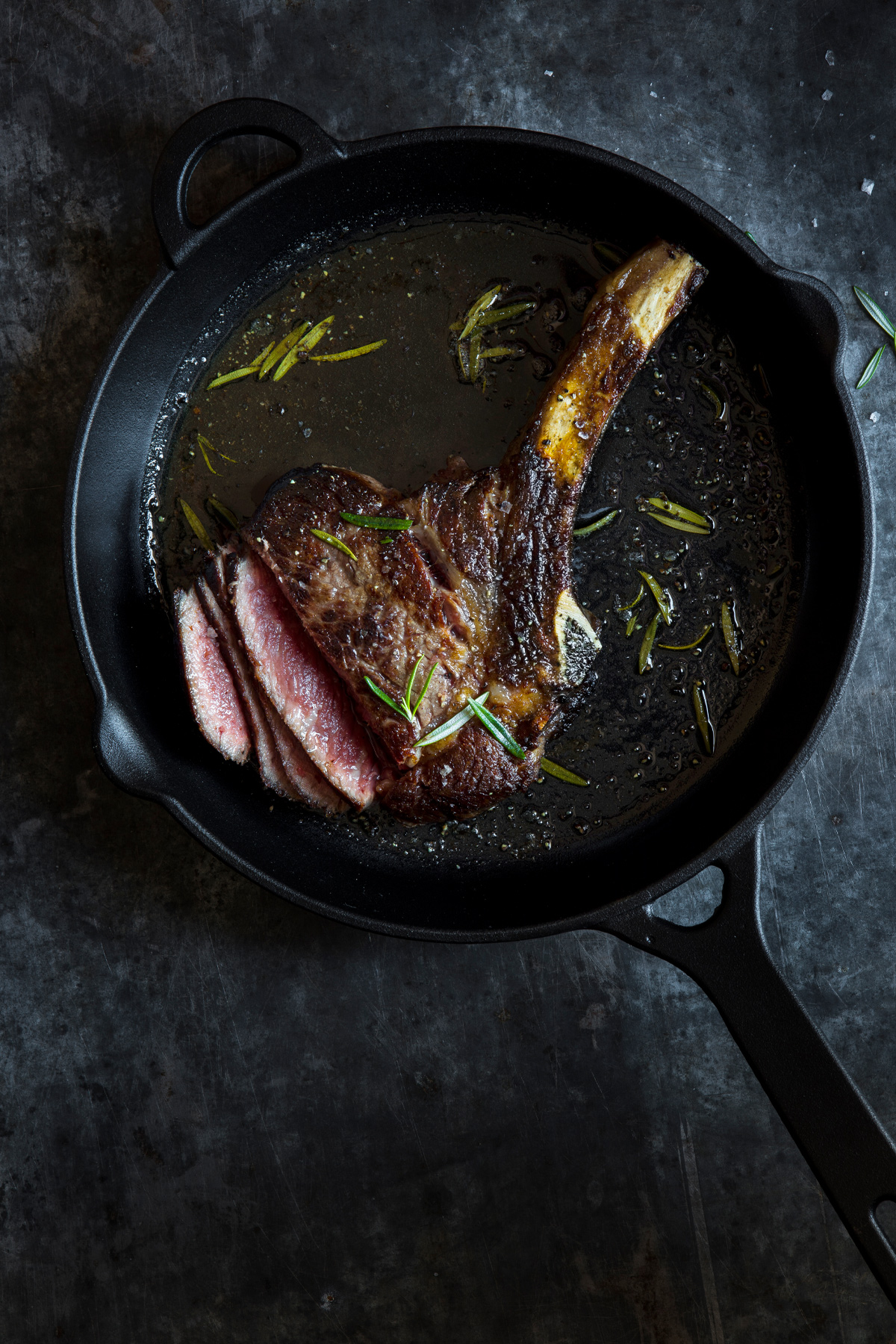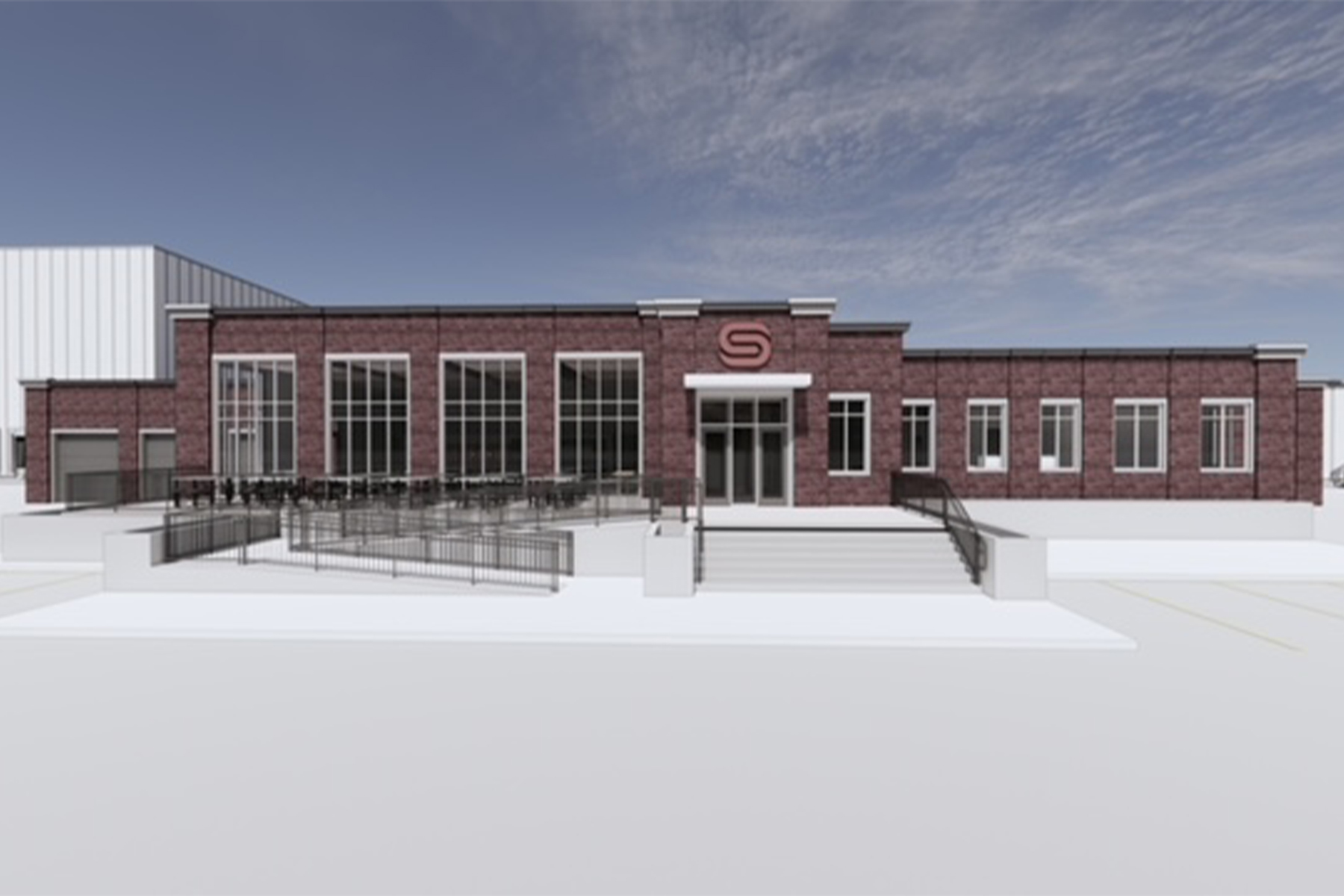Ashli and Ben Rosenthal grew up literally surrounded by the family business. Their home was stockpiled with goods from their dad’s Standard Meat Co.—a teenager’s dream. Weekends were spent raiding the pantry for soups, queso, and spinach and artichoke dips. Steaks were easy to come by, and pool time was interrupted by snacks of giant slices of pepperoni.
If the Rosenthal kitchen shelves resembled the stockroom of a restaurant distribution center, that’s because it wasn’t too far removed from one. Ashli and Ben’s father, William (known by most as Billy), was the third-generation leader at Standard Meat. It was founded in 1935 by Billy’s grandfather, Ben H. Rosenthal, a Russian-Jewish immigrant who launched the company to serve hotels and restaurants in Fort Worth. Today, it has nearly 1,000 employees and works with the biggest brands in the business.
But the story of Standard Meat is far from a traditional succession tale. At one point in its 89-year history, it was absorbed by a conglomerate. The family later regained control of the brand, only to face their most formidable challenge yet—the pandemic. Today, Ashli and Ben are the fourth-generation leaders, guiding the company as it breathes new life into the industry that gave Fort Worth its Cowtown nickname.
Building a Beef Empire
Let’s begin with what Standard Meat doesn’t do. It doesn’t raise or harvest animals, so it isn’t a ranch or slaughterhouse. You won’t find Standard Meat brand steaks or other cuts in grocery stores or its logo on the sides of distribution trucks. The company focuses on value-added processes like the portioning of a cut.
If hotels or restaurant chains want perfectly proportioned 8 oz steaks with consistent thickness and packaging, they turn to Standard Meat. Although you would never know it, you have likely eaten a meal processed and portioned in a Standard Meat factory.
Over the years, the company has expanded its offerings to include cooked items and other food products. These days, customers are restaurant chains, retailers, and meal kit companies.
After its founding in 1935, Standard Meat grew to have its products shipped within a 100-mile radius by 1937 and overnight by train in 1940. It eventually became one of the leading suppliers to hotels, restaurants, and military outlets nationwide. Ben’s son, E.M. “Manny” Rosenthal, took over the business and added in-flight airline meals to the business. During Manny’s tenure, the company suffered some financial hardships, but it was a DFW partnershp that cemented the company’s model.
Collaborating with Norman Brinker of Steak and Ale and Chili’s fame, Standard Meat developed a revolutionary way to package and extend the life of fresh meat in 1969. Manny’s son Billy (Ashli’s and Ben’s father) took over as president in 1981.
But after Manny had a heart attack, the family sold Standard Meat to Consolidated Foods in 1983. (The company rebranded as Sara Lee two years later.) Billy continued to work for the company until he retired in 1989.
For the first time, the Rosenthals weren’t in control of Standard Meat, which essentially did not exist, as it was operating as part of Sara Lee. But Billy couldn’t stay away for long. In 1995, he bought the rights to resurrect the Standard Meat brand from Sara Lee and began serving Outback Steakhouses in North Texas. Over the next decade, the company opened three new facilities, including a Dallas processing plant that’s still active today.
In 2005, global food company Cargill, Standard Meat’s major protein supplier, purchased the business and made the Dallas facility the dedicated supplier of steaks for all Outback locations in the U.S. Under Cargill, Standard Meat began processing chicken in 2014. Although the partnership allowed for significant growth, Standard Meat was destined to return to family ownership, with Ben and Ashli to take the helm.
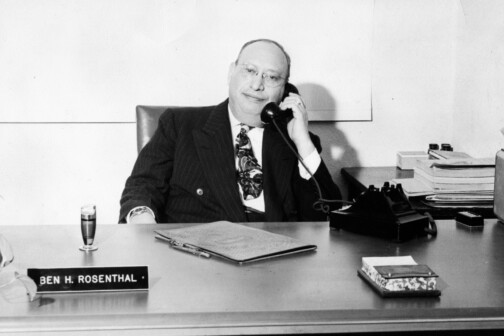
Ben H. Rosenthal founded Standard Meat Co. in 1935 and moved to board chairman in 1959.
The Fourth Generation Takes the Reins
Most family businesses go like this: The first generation establishes the enterprise and passes it on to the next generation or two. At some point, family members decide to cash out to do something else—or nothing at all. But it wasn’t so simple for Ashli and Ben Rosenthal, whose grandfather has a meat science and technology center named after him at Texas A&M.
Despite growing up in the business, the siblings say they never planned to have careers at Standard Meat. At first, neither did. After graduating from Tulane, Ashli spent five years in New York as a communications professional in the fast-moving, cutthroat fashion industry. After working as a hostess in a restaurant and answering phones at a pepperoni plant in her youth, she was adamant that she wouldn’t join the family business. But when she and her husband decided to leave the Big Apple, Fort Worth made as much sense as any for a new home base.
Ben graduated from the University of Virginia and had a successful career as an investment banker with Goldman Sachs in New York. He eventually returned home to work in the family’s investment office, Penrose, but wasn’t sure he would be a part of Standard Meat Co. “Ashli and I never felt any pressure to go into the food business or our family business,” Ben says. “I give my dad a ton of credit for that because I think if it had been the opposite, we would have run away from the business.”
As time passed, the kids returned home and Ashli started a job as a sales associate with CTI Foods, another Rosenthal family business, while Ben worked as a forklift operator for a vending company owned by the family. In 2019, the Rosenthals brought Standard Meat back into the family. In what is described as an amicable move and partnership, the family bought out Cargill. Ashli (who by then had added her married last name of Blumenfeld) and Ben became co-presidents, with Ben also serving as CEO. Around the same time, the company moved from downtown Fort Worth into the stockyards. Standard Meat now operates out of a bright and remodeled Swift and Co. office building, built in 1902 when Swift had a meatpacking plant in the area. (It was later home to a Spaghetti Warehouse restaurant.)
Billy may not have pushed his kids into business, but it would be difficult to imagine better skillsets to bring to the leadership of a company than the finance and public relations backgrounds his children gained during their time away. Billy says his kids have helped professionalize the business, beefing up the sales, management, and finance teams. “They are a great team,” he says. “They are strong, thoughtful, and have respect for each other.”
That corporate experience, teamwork, and ingenuity would prove essential as the company faced its biggest challenge yet.
1969
Standard Meat partners with Norman Brinker and pioneers a packing technology to extend the shelf life of fresh meat.
1981
Like his father before him, Manny moves into Standard Meat’s chairman role and his son Billy assumes the role of president.
1983
Consolidated Foods (renamed Sara Lee in 1985) acquires Standard Meat, ending the Rosenthal family’s ownership.
1995
Billy acquires the Standard Meat Co. brand and relaunches operations to supply 10 DFW Outback Steakhouses.
2001
The company breaks ground at a new Dallas facility that becomes essential to Outback Steakhouse’s supply of meat.
2004
Standard Meat enters an ownership partnership with Cargill to expand
the agriculture giant’s meat processing business.
2019
The company returns to family ownership after an amiable break with Cargill and moves into the historic Swift & Co. building.
2020
Standard Meat launches sous vide and cast-iron cooking platforms and avoids Covid layoffs with a Hello Fresh expansion.
2024
The company plans a 166,000-square-foot processing plant near the Fort Worth Stockyards to handle its emerging sous vide line.
Innovations Sparked by a Crisis
Many industries have pandemic war stories, but restaurants and hotels suffered more than most. And Standard Meat Co.’s fortunes rested on supplying those businesses.
In April 2020, the company received exactly zero pounds in meat orders for the month. The ongoing loss of restaurant business meant Ashli and Ben would have to furlough employees—unless they got creative.
As luck would have it, Standard Meat began working with Hello Fresh in 2017 and as fear of the virus spread, the meal kit business boomed. The siblings responded by turning a processing plant into an assembly operation for the meal kit company. “We love problem-solving moments, and that’s what gives us our energy, which often leads to the next form of our business,” Ashli says.
Standard Meat’s clients eventually returned, and the company is now larger than it was before the pandemic. When its new facility opens, it will have grown from two processing plants to five since 2018. Six years ago, Standard Meat employed about 550 people and processed about 64 million pounds of meat a year; today, it has just under 1,000 workers and processes more than 111 million pounds annually.
It also has become an involved corporate citizen. The company has donated $3 million worth of food and funds to the community in the last five years while upping its standards to limit the environmental impact of its packaging and processing facilities and developing animal welfare requirements for its meat suppliers.
After focusing on portioning raw meat for decades, the company began to expand with cooked meats, launching sous vide and cast-iron cooking platforms and smoked sausage and meatballs.
Standard Meat also partnered with Austin-based Australian chef, TV personality, and author Jess Pryles, founder and CEO of Hardcore Carnivore, which makes meat seasoning and grilling tools. Grocery giant HEB had approached Pryles about launching her smoked sausage brand, and she contacted Ashli.
Despite working mostly with large national accounts, Ashli and Ben saw this as an opportunity to explore a new type of partnership. They helped Pryles source the protein and did multiple rounds of testing to get the flavors right, adjusting their smokehouses to use hardwood smoke. Since launching in July, sales of the Hardcore Carnivore sausage brand have exceeded expectations.
“They have the bigger accounts in place that are imperative to the growth of their business, but it’s rare to find a company that will look back to help move the next person forward,” Pryles says. “That’s exactly what they did.”
An Eye on the Future
Innovations like these could keep Standard Meat going strong for generations to come, but Ashli and Ben say they don’t want to pressure their children to keep things going. Still, they say the cousins are interested in the business and take pride in knowing their family has a role in delivering a Chipotle burrito, for example.
“They will get as involved as much or as little as they want,” Ashli says. “We would love it because it would be fun, but if we had been pressured to have worked in the business, we may have never ended up here.”
Ben knows the perception of children who are handed a successful family business, which is part of the reason he had his own career before joining Standard Meat. “Part of the reason that we wanted to go off and do our own thing was that we never wanted to look like we were those kids that took the easy way,” he says. “We believe that we are good at what we do, and not that it was just handed to us. It motivates us.”
Anyone who has watched Succession knows how difficult it can be to get a multi-generation family business to innovate and shift trajectories. But Ashli and Ben have leaned into change and incorporated outside experience without losing the family feel of the business, all while remaining true to the core of the enterprise. “What got us here won’t get us there,” Ashli says. “We have to be on top of whatever the next evolution of Standard Meat will be to stay relevant. If we weren’t good at that, we wouldn’t be here four generations later.”
Returning to Its Roots
Since 1866, the Fort Worth Stockyards has been integral to the meat industry and continued to be a place where livestock was bought, sold, and slaughtered until the 1950s. In 1976, the stockyards were named to the National Register of Historic Places, and today is a tourist destination. Standard Meat will soon be bringing the beef back to the neighborhood with its fifth meat processing facility, a 166,000-square-foot plant in a restored 1955 plant. “At Standard Meat, we’re all in on Fort Worth and bringing new investment and jobs to the place we’ve always called home,” says Ben Rosenthal, Standard Meat Co.’s co-president and CEO.
Author



